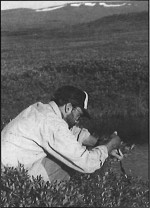Two LTER scientists have been named by President Clinton as recipients of 1996 Presidential Faculty Fellow Awards. Given annually to 15 young scientists to recognize excellence in scientific research and teaching as well as the potential for outstanding contributions, the award carrier a National Science Foundation grant of $100,000 a year for 5 years.
Jim Clark, Coweeta Hydrologic Laboratory LTER.
Jim Clark’s research focuses on effects of climate change and disturbance on forest and grassland biomes. The Coweeta Hydrologic Laboratory LTER is one of his principal study sites. He plans to use the award to expand intensive studies along an elevational gradient at Coweeta and extensive analyses of long-term fire effects in the Central Plains and boreal forest. Clark is Associate Professor (Departments of Botany and Geology) and Director of the Center for Quaternary Ecology and Earth Surface Transformations at Duke University, an interdisciplinary graduate program. He teaches Community Ecology, Paleoecology, and Theoretical Ecology.
George W. Kling, Arctic Tundra LTER.
As Assistant Professor in the Department of Biology at the University of Michigan, George Kling teaches limnology, oceanography and ecosystems ecology with a special interest in geochemistry. In addition to early work on lake studies with the Arctic Tundra LTER project, his work on the carbon budget of the tundra ecosystem represents a major contribution. One ongoing study involves measuring the partial pressure of CO2 in water from soils, streams and lakes, tracing the atmospheric transfer of CO2 from streams with SF6, and using eddy flux to observe the transfer of CO2 from lakes to the atmosphere. Kling is also carrying out comparative research with LTER colleagues to discover the importance of soil water as a contributor to the supersaturation of CO2 that occurs in many temperate lakes. He continues his work in the Arctic as leader of the land-water section of the LTER project and his Work in Africa as leader of a multinational project on Lake Victoria investigating the causes of the recent changes in productivity.

 Enlarge this image
Enlarge this image